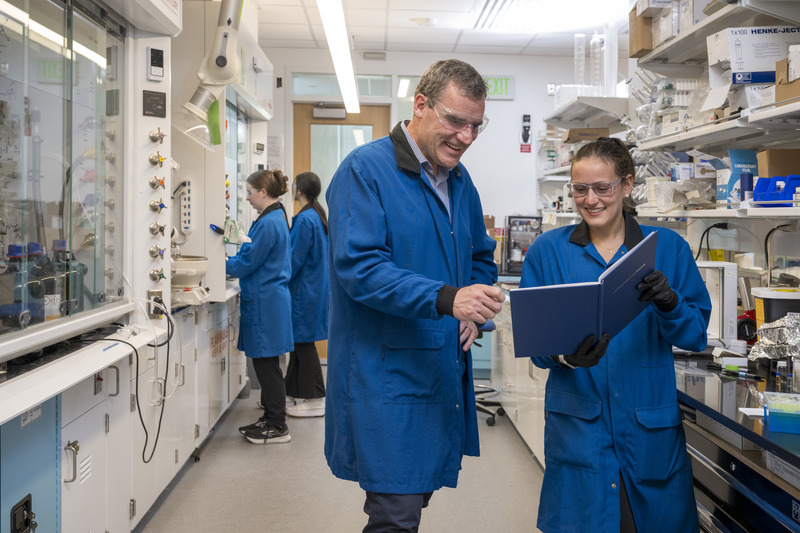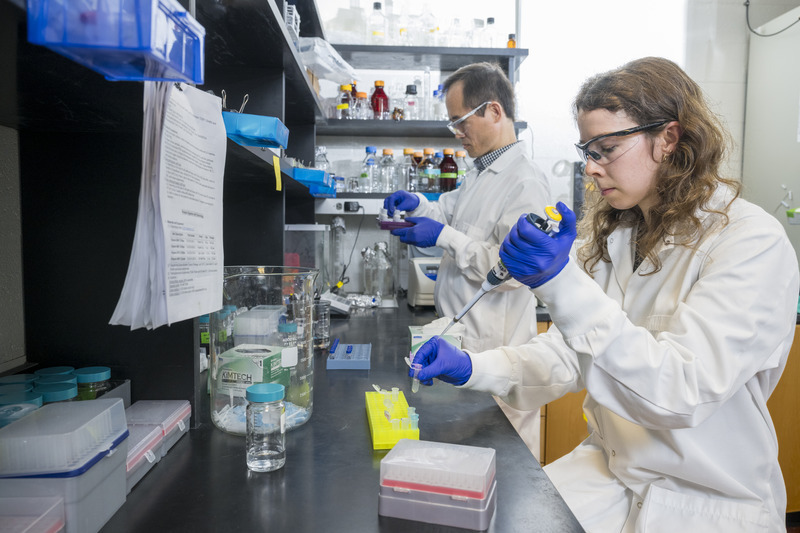


Fresh fuel for research
Photos by Kathy F. Atkinson October 23, 2025
COBRE renewal worth $6 million will enable continued work on new molecules to study and treat disease
The National Institutes of Health (NIH) has awarded $6 million to the University of Delaware for developing new therapeutic leads and strengthening core facility infrastructure focused on finding new molecules for the treatment of disease.
Led by Joe Fox, professor of chemistry and biochemistry, the fresh funding will enable continued and sustained work at the Center of Biomedical Research Excellence (COBRE) on Discovery of Chemical Probes and Therapeutic Leads, which is funded by the NIH’s National Institute of General Medical Sciences.
The overall goal of a Center of Biomedical Research Excellence, or COBRE, is to identify and build up infrastructure within an institution around a scientific area — this includes both people and equipment. There is a large focus on recruiting and retaining research faculty and students who are in the early stages of their careers.
“Our center is focused on chemical probes and therapeutics. So, we’re using molecules, using well-defined chemical entities to probe, understand and control biological systems,” Fox said. “Ultimately, we want to use that information to generate molecules that can be used to have a therapeutic effect.”
The funding provides “rocket fuel” for assistant faculty or researchers without prior NIH awards to become successful on a faster timeframe, Fox continued. Since 2015, the center has funded 31 early career researchers across several departments, including chemistry and biochemistry, biological sciences, engineering, materials science and engineering, physics and astronomy. Most of these researchers have stayed at UD, which is positive for faculty retention.
Research by junior faculty affiliated with the center has produced a variety of discoveries, including a new method for creating a liver cancer-fighting molecule, advanced understanding on how inhalable medications behave in the body, molecular pathways that could lead to new treatments for tuberculosis, and innovative techniques for making proteins more visible and memorable to the immune system, which has the potential to aid in vaccine development.
Catherine Fromen, Centennial Associate Professor for Excellence in Research and Education in the Department of Chemical and Biomolecular Engineering, called her initial COBRE funding “transformative and essential” to her career as a junior faculty member getting started in biomedical research.

“Initial COBRE funding for my nanoparticle research ultimately led to a successful $2 million NIH Maximizing Investigator’s Research Award for moving models to study how medicines travel in the lungs and body,” said Fromen. “That work led to two patent applications and subsequent collaborative research with both faculty peers and industry partners.”
COBRE investigators often take on future leadership roles on campus, too. Fromen is now a UD Innovation Ambassador, sharing with others her experience in moving discoveries from the lab to the world and advocating for institutional resources that support research translation. Meanwhile, Don Watson, professor of chemistry and biochemistry, is leading a newly funded COBRE aimed at developing methods and insights into biochemical pathways and systems affecting human health, building a team that includes several former investigators from the Discovery of Chemical Probes and Therapeutic Leads Center.
“Don Watson, Mary Watson and Catherine Grimes were all investigators on this COBRE as junior faculty. It’s exciting to see them, along with Xinqiao Jia, who was an investigator on the Biomaterials COBRE with PI Tom Beebe, take leadership roles in a new center that will bring 30 additional investigators fresh funding to advance their work,” said Fox.
Creating sustainability for core research infrastructure
This is the third and final phase of the center’s NIH funding. Under Phase III, one-year grants will be awarded for up to 20 pilot projects to help young faculty get new ideas off the ground for advancing chemical tools and approaches to investigate biological systems and address unmet medical needs, Fox said. Recruitment and development of new investigators is also planned through seminar series and workshops, scientific mentoring and continued collaboration with other centers on campus, including Delaware INBRE and the Chemistry-Biology Interface program.
Another major thrust of future work is to create sustainability for infrastructure enhanced or developed over the past decade. So far, Fox and others have brought $7.5 million in sophisticated research equipment to core research facilities developed or built up over the past decade. This includes some 42 major instruments now housed in four research core facilities supported or established under the grant for mass spectrometry, nuclear magnetic resonance spectroscopy, proteomics and synthetic chemistry.
This sophisticated instrumentation enables various complex research. Mass spectrometry and nuclear magnetic resonance spectroscopy equipment enables studies requiring characterization and analysis, small-molecule synthesis, catalyst discovery, computation and microscopy. Proteomics studies monitor proteins and their molecular changes, which has benefits for drug discovery, disease diagnosis and health management, and, potentially, precision medicine. Synthetic chemistry has been used since the 1800s to prepare or synthesize small molecules. For example, most traditional pain medicines, such as Tylenol or aspirin, and traditional chemotherapeutics, including Taxol, are small molecule medicines, making synthetic chemistry studies critical for human health.
These core facilities are broadly used on campus and, apart from the synthetic chemistry core, all are open to industry users.
“For any research that's at the interface of chemistry and biology, this has been a resource for creating the scientific infrastructure that has been heavily relied upon by nearly 600 researchers and 80 research groups,” said Fox.
Over the past decade, center investigators have raised $76 million in funding, with $44 million of this funding still actively applied in research at UD. It’s a significant benefit to the entire scientific ecosystem, particularly students.
“One of the biggest kicks I get is when I go to a graduate or undergraduate student poster session and, as I'm talking to a student, they're showing data critical to their degree advancement that's from instrumentation that we supported through the center,” said Fox. Since 2015, over 110 undergraduate and graduate students and postdoctoral researchers have benefitted from the center.
Fox credited core facility directors with playing a significant role in supporting graduate students, training and mentoring them in the use of complex core facility equipment — skills that pay dividends for students on campus and when these newly minted researchers enter the workforce.
“It's rare to go to a Ph.D. defense and not have the student spend time talking about the core facility directors and how essential they are to their doctoral work,” he said.
As Fox prepares to sunset the center in 2030, he reflected on the importance of bringing together the right people, equipment, mentoring and infrastructure to build up research capacity to deliver solutions that can be translated to society.
He expressed special thanks for the efforts of core facility directors Steve Bai and Caitlin Quinn (NMR); Yinzhi Fang (synthetic chemistry); Papa Ni Asare-Okai (mass spectrometry) and Yanbao Yu (proteomics). He also noted the important role that Dawn Yasik, COBRE administrative coordinator, has played in the center’s success.
“When we started putting this together, we had just hired some fantastic new faculty. It was coming off the 2008-2009 economic meltdown and I wanted to have great colleagues and have them stay here,” said Fox. “Being at a university with great infrastructure was important to me then and it’s important to me now. That's been my incentive.”
Contact Us
Have a UDaily story idea?
Contact us at ocm@udel.edu
Members of the press
Contact us at mediarelations@udel.edu or visit the Media Relations website

